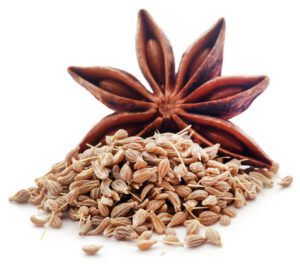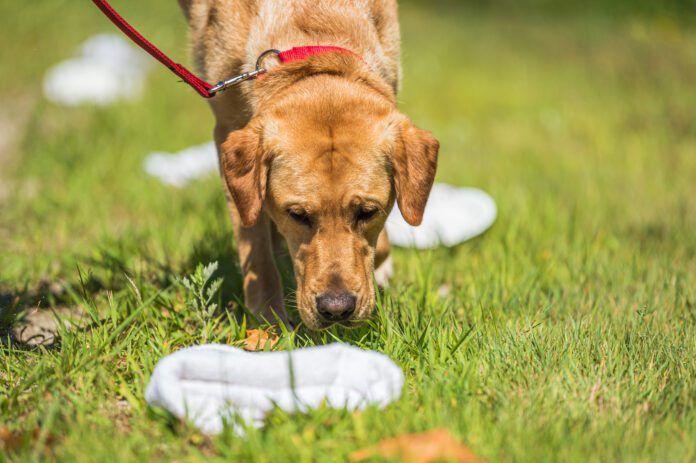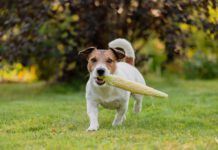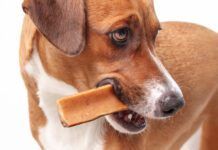Anise, which has a licorice-like taste and fragrance, is not toxic to dogs and is generally considered safe in small quantities. It is often used in nosework training and offers other canine benefits including:
- Improved digestion
- Reduced gas and bloating
- Freshened breath
- Stress reduction
- Increased training interest and focus
Anise vs. Star Anise for Dogs
Anise (Pimpinella anisum) is a flowering annual plant of the parsley family. It is native to Egypt and the Mediterranean but is now grown around the world. Anise is known for its seeds, which flavor sweet and savory dishes and can help alleviate symptoms of indigestion and respiratory illnesses. Anise essential oil flavors spirits like ouzo and arak.

Native to southwest China, star anise (Illicium verum) is a popular spice with a scent similar to anise. However, the plants are unrelated. Star anise seeds, named for their unique star-shaped appearance, have a sweet licorice-like flavor that is more pungent than that of anise seeds.
Star anise is controversial because in large amounts or in concentrated forms (such as distilled essential oils), it can trigger seizures in dogs. While star anise can be used safely in small quantities, anise seeds from Pimpinella anisum are considered the safer choice for dogs.
Are Anise Seeds Safe for All Dogs?
Although most dogs tolerate and benefit from anise seeds, they are not recommended for pregnant dogs because anise can stimulate the uterus. Some veterinarians warn against feeding anise to puppies until they are at least 6 months old because their digestive tracts are still developing. Large quantities of anise seed are not recommended for any dog because large doses depress the nervous system.
When feeding crushed or powdered anise seeds, watch for signs of discomfort, including excessive scratching, loose stools, diarrhea, or vomiting. Such allergic reactions are rare as anise seed is generally safe for dogs, but if any of them occur, discontinue use.
Anise essential oil is not recommended for topical use or as a food additive for dogs. Save the essential oil for nosework training or similar activities.
Using Anise Essential Oil in Nosework
Anise seed essential oil is used in nosework training as a target scent along with other distinctive essential oils such as birch, clove, and cypress. Dogs quickly recognize anise, which enhances their ability to detect and locate items treated with it. Anise naturally excites and interests dogs, which is why it’s popularly known as “dognip” and why exposure to its fragrance makes scent articles all the more rewarding.
Even if your pup is not studying nosework, he can enjoy searching for and finding any toy, towel, or other object that has been scented with a drop of anise essential oil. Recommended sources include Amrita Aromatherapy, Aura Cacia, and Mountain Rose Herbs.
Adding Anise Tincture to Your Dog’s Food
Tinctures are concentrated extracts containing alcohol or glycerin, and although comparisons vary according to manufacturing methods and the quality of ingredients, 1/4 teaspoon of tincture is usually considered equivalent to 1 teaspoon of crushed or ground seeds, and 3/4 teaspoon of tincture is equivalent to about 1 tablespoon of crushed or ground seeds.
Tinctures can be added to your dog’s food, and most dogs enjoy the taste. Recommended anise seed tinctures are available from Herb Pharm, Herbal Terra, and other manufacturers. It typically comes in glass bottles containing eyedropper dispensers.
To determine a daily dose, start with 1 drop of tincture per 2 pounds of your dog’s weight. This would be 10 drops for a 20-pound dog (0.5 ml or about 1/8 teaspoon), 25 drops for a 50-lb dog (1.25 ml or about 1/4 teaspoon), or 50 drops for a 75-lb dog (2.5 ml or about 1/2 teaspoon).
Adding Anise Seeds to Your Dog’s Food
The benefits of adding anise seeds to your dog’s food can include improved digestion, better breathing, and increased relaxation because anise is a mild sedative. Although its use as a respiratory aid is less associated with canine than human health, some dog owners consider anise to be helpful for reducing coughs.
For best results, purchase anise seeds from Frontier Co-op, Starwest Botanicals, Gneiss Spice, or other organic suppliers. Crush or grind them with a mortar and pestle, coffee grinder, food processor, or blender. Store the crushed or powdered seeds in your refrigerator to maintain freshness.
Add small amounts to food and observe your dog’s response. If all goes well and your dog enjoys the taste, increase amounts gradually. Give up to 1/2 teaspoon crushed or powdered anise per day to small dogs (weighing less than 15 pounds); 3/4 teaspoon daily to medium dogs (15-35 pounds); 1-1/2 teaspoons daily to large dogs (35-70 pounds); and 2 teaspoons daily to dogs weighing more than 70 pounds. Divide doses in half if you feed twice a day.
Anise-flavored Dog Treats
Anise seeds flavor all types of foods, including baked goods like biscotti. Bone Bons makes Carrot Anise Biscotti Dog Biscuits so your dog can enjoy that fragrant, crunchy experience, too.
To make your own anise-flavored dog treats (see some sample recipes below), gather the ingredients and equipment, preheat your oven, and line a baking sheet with parchment paper. If using peanut butter or nut butter, look for brands that contain only one main ingredient (peanuts or nuts) and avoid brands containing sugar, xylitol, hydrogenated oils, or other additives.
Combine ingredients one at a time, mixing them with a stand mixer, food processor, or by hand.
After baking, leave treats at room temperature for a day or two, which helps harden biscuits, making them sturdier and crunchier. Depending on ingredients, home-prepared dog biscuits may last for several days to a week or more at room temperature or longer in the refrigerator. For long-term storage, freeze in air-tight containers.
Meaty Anise Dog Biscuits
3-1/2 cups all-purpose flour (wheat, gluten-free, almond, or other)
1 teaspoon baking powder
1/4 cup butter or coconut oil
1/2 cup finely chopped cooked bacon, fish, meat, or chicken
1/2 cup milk or coconut milk
2 tablespoons ground anise seed
Combine ingredients and mix well to create a soft dough. If you have a cookie press, experiment with different shapes and press cookies onto a parchment-covered cookie sheet. If you don’t have a cookie press, create balls and press them with the tines of a fork. Bake at 275°F (135°C) for 30 to 40 minutes or until light brown.
Pumpkin, Carrot, Coconut Anise Dog Biscuits
1-3/4 cup all-purpose flour (wheat, gluten-free, almond, or other)
1/2 cup canned pumpkin puree
2 tablespoons unsweetened peanut or nut butter
2 eggs
1 cup grated carrots
1 cup shredded dried unsweetened coconut
1 tablespoon ground anise seed
Combine ingredients, use a rolling pin to roll the dough 1/4 to 3/8 inch thick, and shape with cookie cutters. Bake at 350°F (177°C) for 30 to 35 minutes or until light brown.
Oatmeal Anise Dog Treats
3 cups rolled oats
1/2 cup unsweetened peanut or nut butter
1/2 cup applesauce, mashed banana, or pumpkin puree
1-1/2 tablespoons ground anise seed
Process the oats in a food processor or blender to create a coarse flour. Add the nut butter, fruit puree, and anise, blending well. Roll the dough to about 1/4 inch thick and cut with a cookie cutter or knife to desired shapes. Bake at 300°F (149°C) on a middle oven rack for 25 to 30 minutes until crisp.







Thank you for the recipes.
Very informative article. I had not heard of this previously. Thanks for sharing your knowledge. Keep these articles coming!